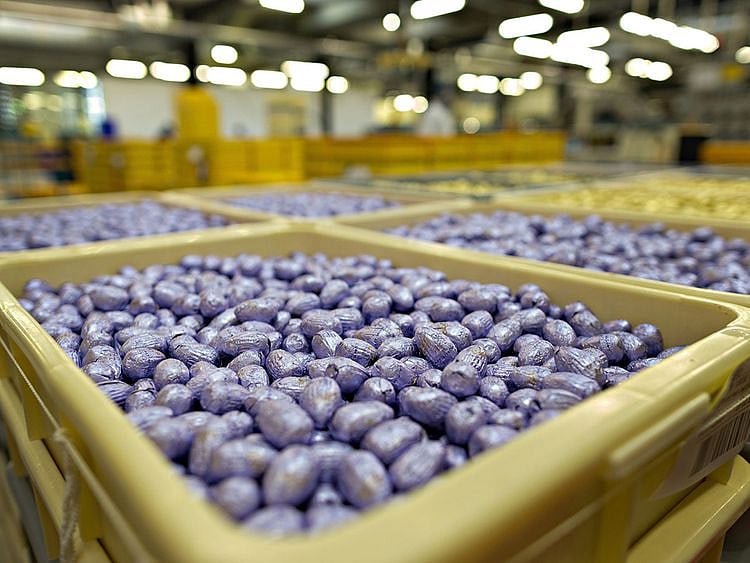Easter egg prices hikes are just the start as cocoa soars
Wholesale beans in New York jumped more than 47%

As the Easter holidays approach, higher cocoa prices mean shoppers are paying far more for their chocolate eggs and bunnies. But that’s just the tip of the iceberg. Higher prices in stores now reflect increases in cocoa in 2023. Since then, the rally has gone into overdrive, and cocoa has more than doubled in price already this year, making it the world’s hottest commodity.
In just the last three weeks, wholesale beans in New York have jumped more than 47 per cent, exceeding $8,900 a tonne “- a level that once seemed unthinkable.
That means even higher prices for households as those moves feed through to retailers. But already, UK shoppers are paying more for chocolate, and sometimes getting less for their money, what’s known as “shrinkflation.” In Brazil, where Easter is a major celebration, chocolate egg prices recently became an internet meme when some stores advertised that people could buy them with loans and payment instalments.
The record surge is being driven by disappointing harvests in cocoa’s West Africa heavyweights, Ivory Coast and Ghana, which account for most of the world’s production.
The industry is largely made up of smallholder farmers who have faced a legacy of poor returns, making it harder to invest in their plots or withstand extreme weather events.
Cost of chocolate
“The true cost of chocolate has not been seen by consumers for a long time,” said Emily Stone, founder of specialty cocoa dealer Uncommon Cacao. “Persistent low prices to producers and climate change are driving the market up to these heights. Now, that comes as a shock to some, but this was predictable.”
The price increase is also a reminder that while headline inflation rates are easing around the world, surges in individual commodities can still put the squeeze on consumers. Chocolate may be seen as more a luxury than a necessity, but brands like Kit Kat and Snickers are often regular parts of weekly shopping baskets.
Consumers may even be more sensitive to such price increases after what they’ve been through in recent years. Memories of the post-pandemic inflation spike “- and the damage it did to household finances “” are still very fresh.
“It’s really expensive,” school counselor Isabel Cristina BrandAPoundo said as she picked up three small private label eggs from a candy store in Sao Paulo. She remembers her shopping cart used to be filled a few years ago. “Now we pay more, for a lot less.”
In the US, the average unit price of chocolate eggs is up 12 per cent over the past year, data from researcher NIQ shows. The cost of some popular Easter eggs in the UK has soared by up to 50 per cent, according to consumer group Which?
Those changes account for only a small portion of cocoa’s colossal rally as key ingredients used to make Easter treats were likely purchased in the fourth quarter of 2023 or earlier.
'Shrinkflation'
Confectionery is among the categories where US consumers are noticing shrinkflation the most, according to a YouGov survey this month. Households are already cutting back on treats; 44 per cent say they buy chocolate or candy less often because of inflation, according to the US National Confectioners Association.
And there’s no relief in sight given what looks like an unstoppable rally, with production shortages expected to persist into the next season. More pain lies ahead when cocoa booked at current sky-high prices will be used for upcoming holidays like Halloween and Christmas.
Earlier this month, Swiss chocolate maker Lindt & SprA.25ngli said it would have to raise prices this year and next because of the jump in raw material costs.
While some companies may have cheap inventories to cover production for the next six months, they will opt for gradual price hikes rather than shock customers with steep increases, said Judy Ganes, president of J Ganes Consulting. “If you push through a price increase now, then you can sustain operations and not have to make a short jump,” she said.
Other top chocolate manufacturers have also raised prices and are leaving the door open for more. Mondelez International Inc. Chief Financial Officer Luca Zaramella in February signaled increases are likely, while Hershey Co. Chief Executive Officer Michele Buck said the company remains “committed to pricing to cover inflation.”
Nestle SA said while it’s absorbed some higher costs through efficiencies, it may need to make “responsible adjustments to pricing in the future given the persistently high cocoa prices.”
Sign up for the Daily Briefing
Get the latest news and updates straight to your inbox
Network Links
GN StoreDownload our app
© Al Nisr Publishing LLC 2026. All rights reserved.